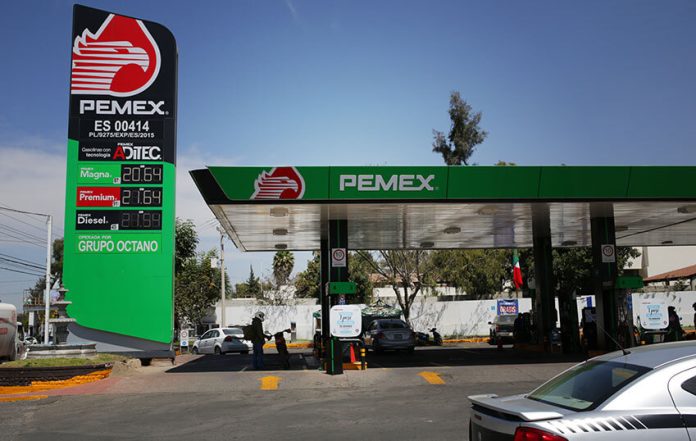Mexico is seeing a rapid spike in oil theft across much of the country, with observers divided as to whether high gas prices have led to more robberies, or vice versa.
On May 23, Defense Minister Luis Crescencio Sandoval announced at the government’s monthly security briefing that oil theft had increased from 5.1 million barrels in January to 7.5 million barrels in April.
On the same day, a report by La Razón highlighted the scale of the crisis with the western state of Jalisco seeing a staggering 944% rise in cases of oil theft between January and March 2021 to 2022. These increases seem highly focused on northern Mexico since the border state of Sonora saw oil theft grow by 140%, followed by Durango at 100% and Nuevo León by 87.8%.
Earlier this month, industry experts told Mexican media Publimetro that this rise was in part due to more attacks on gas tankers alongside the traditional taps of oil pipelines. Registered attacks on tanker trucks rose from 125 in the first quarter of 2021 to 412 in the same period of 2022.
According to the report, criminal groups have set up checkpoints and blockades across several states in Mexico to systematically rob trucks, causing logistical problems for the state-owned petroleum company, Pemex. Some gas stations have been forced to close their pumps after running out of fuel, causing long lines at those petrol pumps that still had reserves.
However, the tapping of pipelines remains a real concern. In early May, Cresencio announced that in Puebla – a central state through which several major oil pipelines pass – security forces had recovered 2.3 million liters of stolen fuel and arrested 217 alleged perpetrators. Over 6,000 instances of pipeline tapping had been discovered in Puebla in the last three years, he added.
In the first quarter of 2022, there were 3,199 reports of pipeline siphoning, representing a 14% year-on-year increase.
This increased criminal focus on oil theft has come amid soaring gas prices. In early March, a gallon of premium gasoline sold for nearly US $5.65 in Mexico City, up from an average of $3.97 four months earlier.
InSight Crime analysis
Pipeline tapping and fuel truck robberies have been linked with heightened gas prices and fuel shortages in the past. In 2019, the Mexican government restricted moving oil through the national pipeline system to stem the illegal taps, causing massive shortages in Mexico’s western states, particularly in Jalisco.
While oil theft has been a criminal economy of choice for years in Mexico, a hike in oil prices has incentivized the black market for gasoline more than ever.
In 2022, inflation and the Russian-Ukrainian war have raised oil prices globally. Despite government subsidies that make gas affordable to most Mexicans, companies have run into problems with supply, reported Publimetro. In the northern regions of Mexico, shortages were exacerbated by the influx of Americans crossing the border in search of cheaper gas prices.
All of this has provided criminals with the perfect reason to redouble their oil theft efforts. The Latin America Risk Report points out that criminal groups are not only incentivized to exploit higher prices through theft and contraband sales but also extort energy companies who are reaping the profits of higher prices.
Indeed, it could be suggested that the potential for huge profits on stolen gas during times of scarcity or high price have directly led to the creation of criminal elements in Mexico, which have gone on to do untold damage to the country.
Investigative journalist Daniel Blancas told Aristegui Noticias that the 2017 gasolinazo crisis, caused by the greatest hike in gas prices in 20 years, was responsible for an explosion of pipeline tapping. One of the most notorious groups associated with oil theft is the Santa Rosa de Lima Cartel. Its operations centered around huachicol, and brought in estimated profits of $800,000-$1.2 million a day at the height of their operations in 2018. Guanajuato, the state where the cartel is based, now ranks among Mexico’s most dangerous.
According to a recent report from the International Crisis Group, fuel theft started to spike in 2010 as the Zetas and the Gulf Cartel entered the illicit economy.
More recently, criminal groups have continued to target insecure oil and gas infrastructure, drilling sophisticated tunnels to access pipelines and ramping up their use of technology to avoid detection.
In 2020, huachicoleo was so rampant that Roberto Díaz de León, president of the national fuel retailers association ONEXPO, referred to fuel thieves as the main competitors of gas station owners. “In this country, there is an illegal parallel network of fuel supply and distribution whose presence and influence is quite strong,” he told Mexico Business News in an interview.
Cachimbas, unregulated roadside stops where motorists can fill their tanks illegally, are the most common way criminal groups resell their siphoned fuel. According to Díaz, there are at least four cachimbas for every one of Mexico’s 13,000 legal gas stations.
Reprinted from InSight Crime. Henry Shuldiner is a writer with InSight Crime, a foundation dedicated to the study of organized crime.
